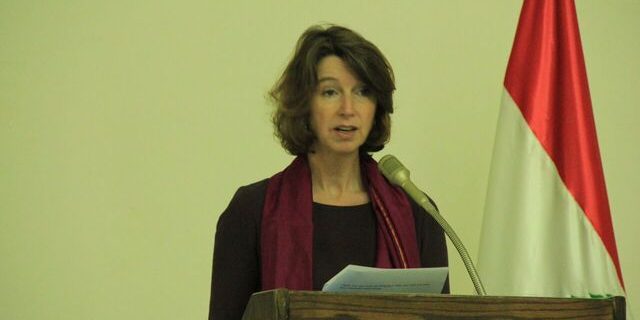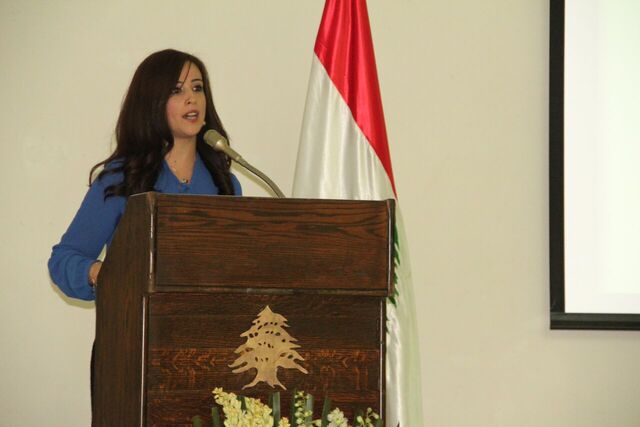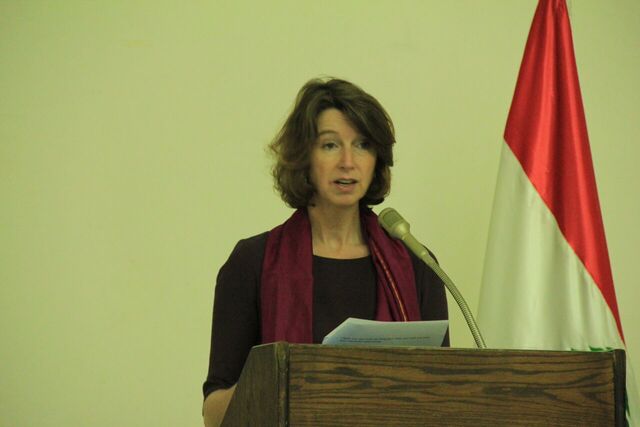The closing ceremony for the “Developing History Teachers Capacity for Developing Historical Thinking” training program took place in November 30, 2015 at UNESCO palace in the presence of Dr. Nada Hassan, representative of the Ministry of Education and Higher Education. The program, which ran between October 2014 and September 2015, is an intensive training program for a group of history teachers focused on disciplinary approaches to learning and teaching history. Dr. Maha Shuayb , LAH President and Director of the Centre for Lebanese Studies, opened the ceremony. She welcomed the audience and thanked all the parties who supported the program including the Embassy of the Kingdom of the Netherlands, the Centre for the Lebanese Studies and the Center for Applied Research in Education (CARE) at Notre Dame University – Louaize.
The ambassador of the Kingdom of the Netherlands, Mrs. Hester M. J. Somsen, expressed her hope in introducing positive change through new approaches to learning history and commended the role of the Lebanese Association for History in bringing about change in history pedagogy. Her Excellency also expressed pleasure to attend the ceremony at the UNSECO building, destroyed in 1982 and renovated in 1998, and pointed out that the building itself reflects the history of Lebanon in both war and peace.
Mrs. Nayla Hamadeh, Project Manager, presented the program’s vision and objectives. Mrs. Hamadeh started by introducing LAH, founded in 2013, and its goal to “develop a broader understanding for the learning and teaching of history as discipline with its own set of concepts, strategies, and tools”. She explained how the project responds to this vision by “introducing strategies that enable learners to apply historical concepts and higher-order thinking and relate history issues to life situations”. Mrs. Hamadeh stressed on its importance of building a generation who has the ability to analyze and critique history and relate it to the present. She ended by announcing that LAH will be conducting a new training program in 2016 to equip teachers with the knowledge and skills needed to apply historical thinking in the classroom.
Dr. Bassel Akar, Director of CARE and Assistant Professor at Notre Dame University – Louaize, pointed out that learning about the past is important for social reconstruction and cohesion. He explained that in order to have democratic classrooms, it is important to transform from learning one single narrative to examining various sources and evidences and construct arguments that explain the past. Dr. Akar added that the research center CARE believes that change in education happens through teachers. In this program, the teachers designed units and lesson plans for main inquiry questions.
The ceremony included two presentations by participant teachers. Amira Hariri from Houssam Eddine Hariri High School (Saida) and Jihan Francis from Eastwood College (Mansourieh) who presented history units that they had designed and applied in their classrooms. Amira’s enquiry question “Why did a civil war erupt in Lebanon in 1975?” focused on the historical concept of “causation”. Jihane’s unit focused on the historical concept of “change and continuity” through a sensitive enquiry question “To which extend did the Qaimaqamiyatayn period lay the foundation for political sectarianism in Lebanon?”. Both teachers showed images from their classrooms and shared the activities that were conducted to allow students to address the enquiry questions.
The ceremony ended by a discussion on opportunities and challenges facing history teachers in facilitating disciplinary approaches to learning and teaching history in Lebanon.




